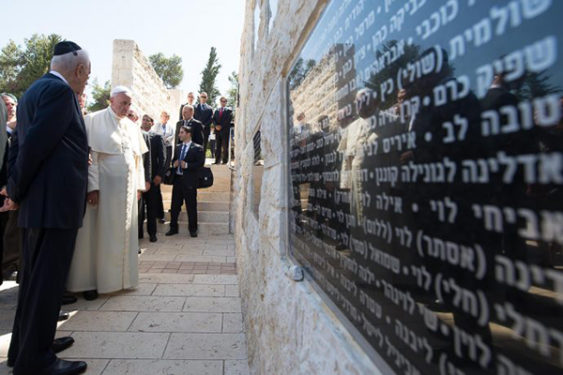
By Christopher White, The Tablet’s National Correspondent
NEW YORK – Reflecting on the 25th anniversary of the establishment of diplomatic ties between the Holy See and Israel, New York’s Cardinal Timothy Dolan hailed the occasion as an international achievement that has “quite literally made the world a better place.”
Cardinal Dolan’s remarks came during a panel discussion on “The Vatican Israel Accords: 25 Years of Progress and Challenge” held at Fordham University on June 19, marking the Fundamental Agreement signed between the Holy See and the State of Israel in 1993, leading to full diplomatic relations in 1994.
The event was co-sponsored by the United States Conference of Catholic Bishops (USCCB) and the Consulate General of Israel in New York, and along with Cardinal Dolan, speakers included Dani Dayan, Israel’s Consul General in New York; Archbishop Bernardito Auza, papal nuncio to the United Nations; and Dr. Adam Gregerman, the Co-Director of the Institute for Jewish-Catholic Relations at St. Joseph’s University.
In his opening remarks, Dayan recalled Theodore Herzl’s meeting with Pope Pius X in 1904 in which he sought support for the Zionist’s efforts to create a Jewish state. Pope Pius rebuffed Herzl at the time, but Dayan observed that just over a century later, in 2014, Pope Francis would visit Israel and lay a wreath at his grave.
Dayan summarized the moment as a culmination of a “century-long dialogue” between Israel and the Catholic Church.
“We understand fully what an incredible journey – spiritually and politically – we have done in a mere 100 years that mended, repaired so many negative things that have been done in a millennia of history,” he said in acknowledgement of the historically troubled relationship between Jews and Christians.
Gregerman described recent progress as one of “genuine friendship,” adding that there exists “no parallel in history” for any two religious traditions to have made such a “dramatic break with the past” in committing to work together as allies for common cause.
Multiple mentions were made of Nostra aetate, the Second Vatican Council document that provided a reset for Jewish-Catholic relations by acknowledging the shared bond between Christians and the Jewish people and called for mutual respect, engagement, and dialogue.
Cardinal Dolan described St. John Paul II’s passion to pursue formal diplomatic ties between the Holy See and Israel as a “master stroke” of his papacy, recalling his personal assistant, now cardinal, Stanisław Dziwisz’s words that it was an “obsession” since the day of his election for the late Polish pope.
“He saw it simply as the right thing to do. He viewed it as proof of the Holy See’s constant refrain that dialogue and diplomacy were the most effective tools for the achievement of justice and peace,” said Cardinal Dolan. “He considered it theologically driven as almost a credo in the Christian expression of covenant and land. And he believed it (to be) didactic as a final repudiation of sordid Christian anti-Semitism.”
“And he was right,” Cardinal Dolan insisted.
Auza, drawing on his own experience as a diplomat at the United Nations said, “the Holy See has worked hard during these years, alongside the State of Israel, to fight against the abomination of anti-Semitism. It renews this vigorous and ever urgent commitment as new forms of the evil of anti-Semitism have been arising.”
Both Cardinal Dolan and Auza expressed their gratitude for the solidarity of Jewish allies in response to the recent rise in attacks against Christians.
“The Holy See is also grateful for the friendship and leadership of so many of our Jewish elder brothers and sisters in helping Christians learn to acknowledge and courageously oppose growing anti-Christian violence and what we call Christianophobia, because attacks against Jews and Christians are increasingly coming from the same intolerant groups,” said Auza.
Looking ahead, all of the participants acknowledged that challenges remain, particularly when it comes to outstanding agreements over money and land.
Cardinal Dolan said that these disagreements over property rights and tax exemptions are not unique to Israel and the Holy See, labeling the outstanding questions as “terribly vexing.”
Similarly, Gregerman highlighted that because of the recent improvement in Jewish-Christian relations, there is enough trust for the two states to “keep talking.”
“For both Jews and Christians, humanity is on the right path when human agreements mirror the divine will,” said Cardinal Dolan. “That’s what we believe occurred a quarter century ago when the leaders of the government of Israel and the Church universal signed an agreement stressing reconciliation, trust, the priority of dialogue – all grounded in human rights and religious liberty.”
“It makes us Catholics in the United States proud of our Church, and by the way grateful to be American citizens as we realize that our country here encouraged, even pestered, both sides to get this done,” Cardinal Dolan said. “It inspires us to continue to dare, never to be straight jacketed by apprehension and hesitancies of the past.”
“Every once in a while, the good guys seem to win. Hard work and patience pays off and progress is made. Thank God,” he concluded.
